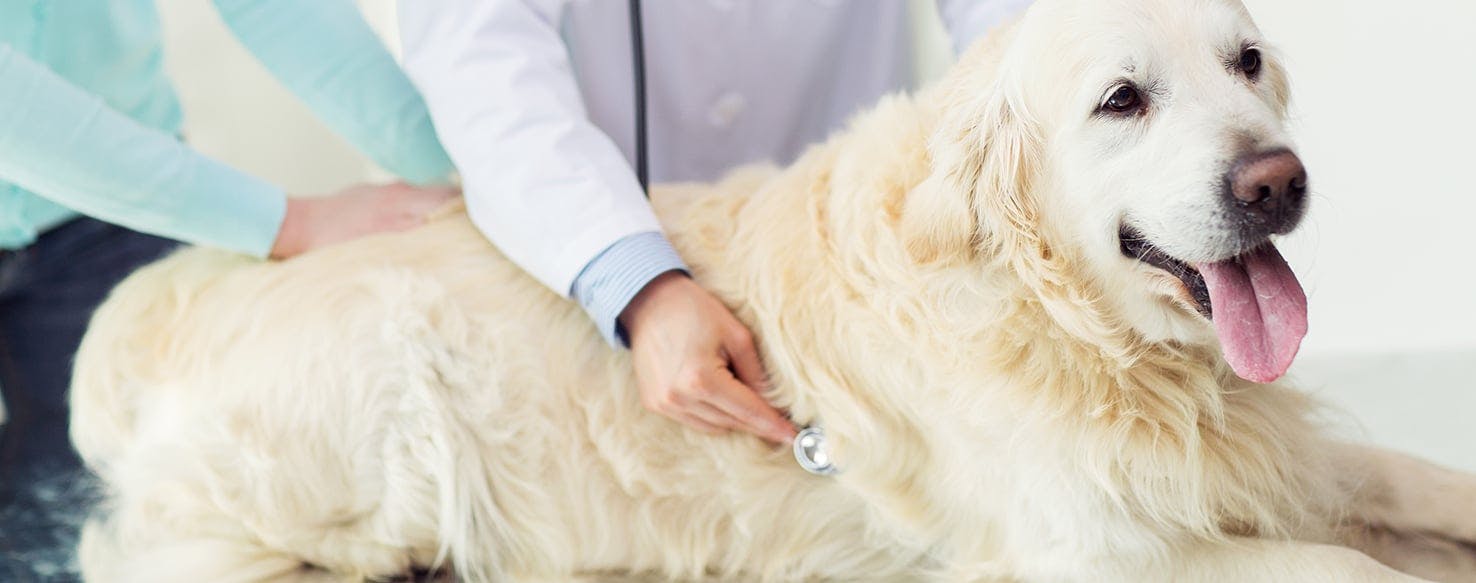- Home
- Dog Wellness
- What to Expect at Your Dog's Annual Vet Checkup
3 min read
What to Expect at Your Dog's Annual Vet Checkup

Save on pet insurance for your pet
You don't have to choose between your pet and your wallet when it comes to expensive vet visits. Prepare ahead of time for unexpected vet bills by finding the pawfect pet insurance.
Have you noticed that when something changes gradually, you often don't notice? Like an expanding waistline, for example!
The same is true for your dog. Because your pet pal is with you every day, it's often difficult to spot changes such as weight loss or gain, a change of body shape, or a subtle lameness. This is just one reason why annual vet checkups are such a crucial part of keeping your best buddy fit and well.
When your dog is well, a health check helps them stay that way. It's also a chance for the vet to record your dog's weight, heart rate, and breathing pattern. This provides a valuable reference for when a problem is suspected, often enabling the vet to get on top of treatment faster.
So what can you expect when your dog goes for their annual overall?
#1: What is the Vet Looking For?
Just like you, the vet wants your fur-friend to stay fit and well. As well as preventative care (see #3) the vet's health radar is tuned into change - such as increased thirst, decreased appetite, or lack of energy.
To do this the vet takes a 'history'. But relax, you might not even recognize they've done this because it's basically a chat about:
-
Toilet habits
-
Eating and drinking
-
Behavior
-
Mobility
-
Changes that you've noticed
The vet will also ask about:
-
Deworming
-
Parasite control (including heartworm)
-
Neutering status
-
Requirements for vaccination (a risk assessment of the disease each dog may come into contact with)
The vet then uses this information, to troubleshoot during the physical exam.
#2: The Physical Exam
Each vet has their own routine for an examination, so they don't miss anything. Commonly, this means starting at the head end and working backward!
Typically the vet looks at:
-
Eyes: That the cornea is bright and clear and the lens is not cloudy
-
Ears: Checking for signs of infection, allergy, or excessive wax buildup
-
Teeth: Are the gums sore (gingivitis), teeth coated in tartar, or wobbly teeth present?
-
Gums: That they are a healthy pink color
-
Coat: Are there any flea dirts or signs of external parasites? Is the coat plush and glossy, or patchy and dry?
-
Lumps and bumps: These are measured and recorded
-
Chest: Listens to the heart with a stethoscope to measure the rate, rhythm, and grade any murmurs present
-
Abdomen: Feeling for any lumps that shouldn't be there, or localized areas of discomfort
-
Rear end: Are the anal glands clear and the anus clean?
-
Nails: Any long nails are trimmed back
In addition, the vet will suggest an action plan, based on these findings. Plus, they'll also take a number of routine practical steps.
#3: The Practical Stuff
Much of this is routine, such as:
-
Weigh: Building up a record of the dog's weight, year on year, is a great way to spot health problems early
-
Scan the ID chip: If your dog is microchipped, this is a great chance to check it's working
-
Vaccination: Which vaccines are given should be based on an individual risk assessment for each dog
-
Deworming: Get on top of those pesky internal worms
-
Parasite control: Such as heartworm, fleas, and ticks
Depending on the age of your dog, the vet might suggest some extras.
-
Urine tests: Checking how weak or strong the urine is, and checking for glucose or protein
-
Blood pressure monitoring: Becomes more important as the pet ages
-
Heartworm blood test: The AVMA advises this is done yearly, even when a dog takes a regular preventative.
-
Fecal exam: To check that dewormer is doing its job.
So there we have it: What to expect during your dog's annual checkup. This is also your chance to quiz your vet about any pet niggles, such as what to feed or how to clean their teeth.
In addition, don't be afraid to ask to see the same vet each year (where possible.) Not only will you build a rapport with that professional, but they'll become accustomed to your dog. Again, this helps them to recognize subtle changes year-on-year...which could be the first clue to a problem that needs to be investigated and treated.
You may also like
